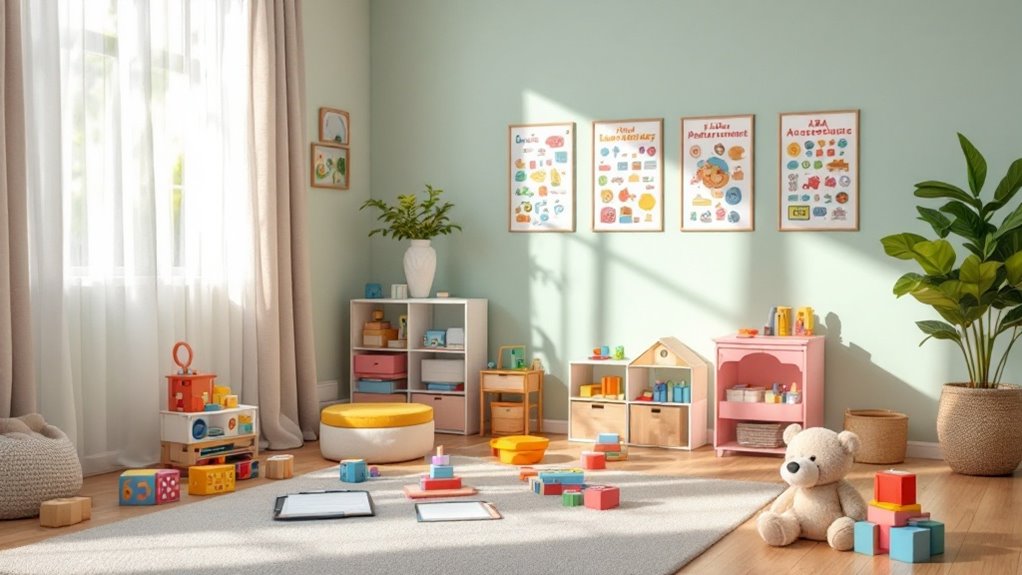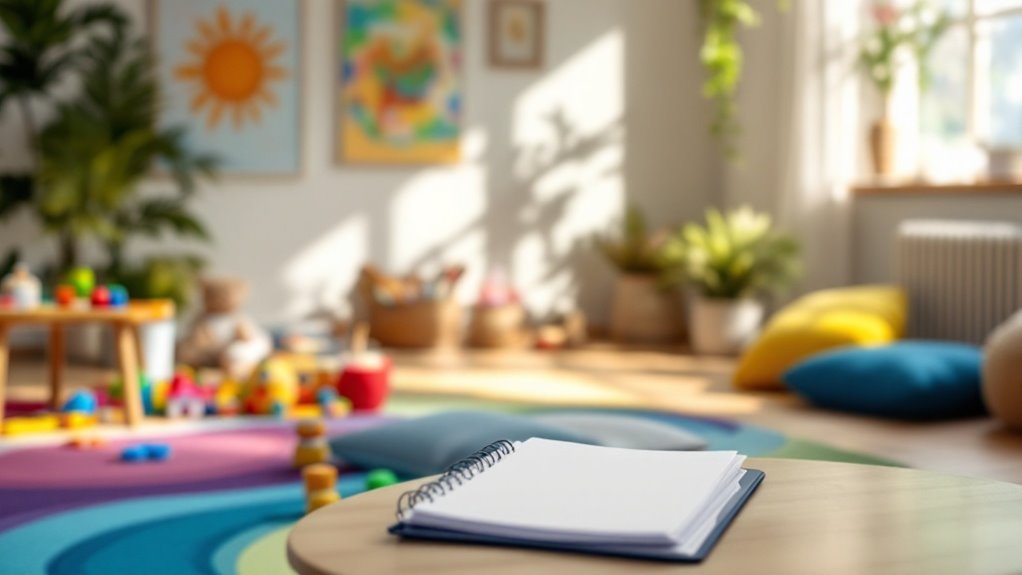To prepare for your child's ABA assessment in Aurora, start by gathering all relevant documents, like previous evaluations and school reports. Share your observations of your child's behavior at home and in different settings. Explain the assessment process to your child, using positive reinforcement to ease any worries. Creating a distraction-free environment helps them focus better during the assessment. Familiarize them with the assessor beforehand, as building trust can make a big difference. This preparation sets the stage for success, and there's much more you can discover to enhance your child's experience and outcomes.
Key Takeaways
- Gather relevant documents, including previous evaluations and school reports, to provide a comprehensive view of your child's behavior and development.
- Discuss the ABA assessment process with your child to set clear expectations and reduce anxiety about the experience.
- Create a quiet, distraction-free environment for the assessment by minimizing noise and clutter in the assessment area.
- Encourage your child to ask questions and express feelings about the assessment to foster a sense of control and comfort.
- Follow up after the assessment by reviewing feedback and collaborating with the ABA provider to implement targeted strategies for your child's growth.
Understanding ABA Assessments

Understanding ABA assessments is vital for parents looking to support their child's development. These assessments help identify your child's unique strengths and challenges, guiding you and the professionals in selecting the most effective ABA techniques. When you understand the purpose behind these assessments, you can better advocate for your child's needs.
The primary assessment goals include gathering data on your child's behavior, communication skills, and social interactions. This information helps create a tailored plan that addresses specific areas needing improvement.
By actively participating in the assessment process, you'll gain insights into your child's learning style and what motivates them. This knowledge is invaluable when working with therapists and educators.
You might feel overwhelmed at first, but remember, the goal is to create a supportive environment for your child. Ask questions, engage in discussions, and share your observations. Your input is essential in ensuring the assessment accurately reflects your child's abilities and needs.
Embracing the assessment process can empower you to make informed decisions, ultimately leading to a more positive outcome for your child's development. So, get ready to plunge into and support your child every step of the way!
Gathering Necessary Information
Before the assessment, gathering necessary information about your child can make a significant difference in the process. Start by compiling relevant assessment documentation, including previous evaluations, school reports, and any notes from therapists or teachers. This detailed overview gives the assessor valuable insights into your child's strengths and challenges.
Next, observe your child in various settings. Take notes on their behavior during everyday activities, social interactions, and any particular triggers or preferences. This information gathering helps highlight patterns that can be essential during the assessment.
Don't forget to include your observations as a parent. Your unique perspective on your child's behavior and development is invaluable. Consider writing down specific examples of skills they excel at or areas where they struggle.
Lastly, if there are any medical or developmental concerns, be sure to document those as well. Providing a holistic view of your child will aid the assessor in understanding their needs better.
With thorough information gathering, you'll set the stage for a more effective and meaningful assessment process.
Preparing Your Child Emotionally

Preparing your child emotionally for their ABA assessment is just as important as gathering the right information.
Start by explaining the process clearly, so they know what to expect, and use positive reinforcement techniques to build their confidence.
Practicing relaxation strategies together can also help ease any anxiety they might feel about the assessment.
Explain the Process Clearly
Communicating the details of the ABA assessment process can make a significant difference in how your child feels about it. Start by explaining what an ABA assessment is and why it's important. Share the assessment timeline, letting them know how long it will take and what to expect each step of the way. This clarity can help reduce any anxiety they might have.
Next, outline the assessment goals. Explain that the purpose is to understand their unique needs better and develop strategies to support them. Reassure your child that the assessment isn't a test; it's a way for the team to learn about their strengths and challenges. Use simple language and examples they can relate to, like explaining that it's similar to a check-up at the doctor's office.
Encourage questions and let your child express their feelings. Validate their emotions and remind them that it's okay to feel uncertain. By openly discussing the process, you're helping them feel more in control and prepared, setting a positive tone for the assessment ahead.
Use Positive Reinforcement Techniques
Building on your child's understanding of the ABA assessment process, using positive reinforcement techniques can further help them feel supported and confident. When you highlight their efforts and accomplishments during this time, you create an encouraging atmosphere that can ease any anxiety they might feel.
Start by discussing what behaviors you'd like to see during the assessment. For example, if your child is nervous, emphasize the importance of staying calm and engaged. When they demonstrate those behaviors, make sure to recognize and praise them immediately. This could be as simple as saying, "Great job for staying focused!"
You can also establish small behavior rewards, like stickers or extra playtime, that they'll receive for achieving specific goals during the assessment. This not only motivates your child but also reinforces the idea that their efforts are valued.
Practice Relaxation Strategies Together
Practicing relaxation strategies together can make a world of difference in how your child approaches the ABA assessment. By introducing mindfulness exercises and breathing techniques, you can help your child feel more at ease and confident. Make it a bonding experience; practice these strategies daily so they become familiar and comforting.
Here's a simple table to guide you in your practice:
| Technique | How to Practice | Benefits |
|---|---|---|
| Deep Breathing | Inhale slowly through the nose, exhale through the mouth. Repeat 5 times. | Reduces anxiety, promotes calmness. |
| Guided Imagery | Have your child close their eyes and imagine a peaceful place. | Encourages relaxation, fosters creativity. |
| Mindfulness Exercises | Focus on the present by observing surroundings or sensations. | Enhances focus, improves emotional regulation. |
Creating a Comfortable Environment
Creating a comfortable environment for your child during the ABA assessment can really make a difference.
Start by minimizing distractions in the space and introducing your child to the assessors beforehand to ease any anxiety.
A familiar and calm setting helps your child feel safe and ready to engage.
Minimize Distractions
To guarantee your child feels at ease during their ABA assessment, it's essential to minimize distractions in their environment. Start by creating a distraction-free zone where they can focus on the assessment without interruptions. Choose a quiet room away from the hustle and bustle of daily life. This will help your child concentrate better and feel more secure.
Next, think about minimizing noise. Turn off any TVs, radios, or other electronic devices that could divert their attention. If possible, ask family members to keep the noise down during the assessment. You might even consider using soft background music if it helps your child relax, but make sure it's not distracting.
Additionally, remove any clutter or toys that could capture their interest. A clean, organized space can help your child feel less overwhelmed and more focused.
Familiarize With Assessors
While minimizing distractions in your child's environment is important, understanding who'll be conducting the ABA assessment can greatly enhance their comfort level. Familiarizing yourself with the assessors can make a significant difference.
Look into their qualifications—what training and experience they've in working with children similar to yours. Knowing that your child will be in capable hands can ease your worries.
It's also essential to learn about their communication styles. Some assessors might be more hands-on, using playful interaction, while others may take a structured approach. Understanding these differences can help you prepare your child for the kind of interaction they'll experience. You can even role-play or discuss what to expect, which can alleviate any anxiety.
Consider reaching out to the assessor beforehand. A brief conversation can provide insights into their methods and personality, giving you a better sense of how they'll connect with your child.
This preparation not only builds trust but also fosters a smoother assessment process. Ultimately, when your child feels comfortable with the assessor, they'll be more open to engaging, leading to a more effective assessment.
What to Expect During the Assessment

Understanding what to expect during your child's ABA assessment can alleviate some of the anxiety that often accompanies this process. The assessment typically lasts between 1 to 3 hours, depending on your child's needs. During this time, your child will engage in various assessment activities designed to evaluate their skills and behaviors.
Here's what you can expect:
- Your child may participate in structured play, which helps assess their social skills.
- The assessor will observe your child's interactions and responses in different scenarios.
- You'll likely be asked questions about your child's history and routines.
- Expect to see some tests that measure communication and daily living skills.
- After the assessment, there'll be a discussion about the findings and next steps.
Following Up After the Assessment
After the assessment, it's important to take proactive steps to guarantee your child gets the most benefit from the insights gained.
Start by reviewing the assessment feedback carefully. This feedback will help you understand your child's strengths and areas for growth. Take notes on specific recommendations and strategies suggested by the assessor.
Next, reach out to your ABA provider to ask about follow up resources. They may offer additional materials, workshops, or support groups that can help you implement the strategies discussed. Don't hesitate to ask questions—clarifying any uncertainties can make a big difference.
Consider setting up regular check-ins with your child's therapist to monitor progress and adjust strategies as needed. These sessions are invaluable for staying on track and ensuring your child's needs are met effectively.
Lastly, involve your family in this process. Share the feedback and strategies with them so everyone is on the same page. This collaborative approach can create a supportive environment that fosters your child's growth.
Essential Key Takeaways for Preparing Your Child's ABA Assessment
So, there you have it—preparing for your child's ABA assessment isn't rocket science, but it might feel like trying to teach a cat to fetch! By gathering info, calming nerves, and creating a cozy atmosphere, you're setting the stage for success. Just remember, if the assessment goes well, you might just want to treat yourself to a nice cup of coffee—because, let's face it, you deserve it after all that prep work! Good luck!

